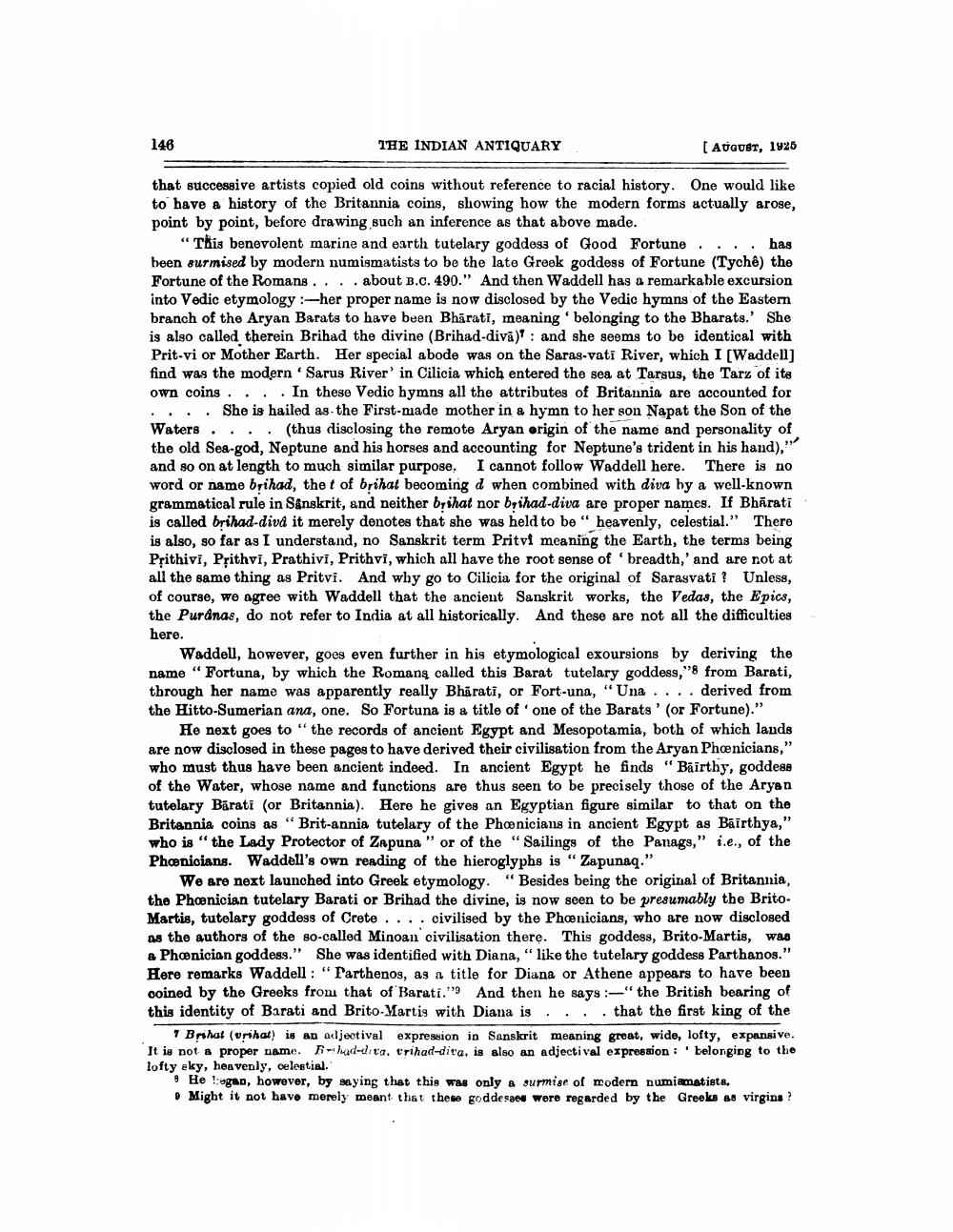________________
146
THE INDIAN ANTIQUARY
(Argust, 1926
that successive artists copied old coins without reference to racial history. One would like to have a history of the Britannia coins, showing how the modern forms actually arose, point by point, before drawing such an inference as that above made.
“This benevolent marine and earth tutelary goddess of Good Fortune .... has been surmised by modern numismatists to be the late Greek goddess of Fortune Tychê) the Fortune of the Romans .... about B.c. 490." And then Waddell has a remarkable excursion into Vedic etymology :her proper name is now disclosed by the Vedic hymns of the Eastern branch of the Aryan Barats to have been Bharati, meaning 'belonging to the Bharats. She is also called therein Brihad the divine (Brihad-diva)': and she seems to be identical with Prit-vi or Mother Earth. Her special abode was on the Saras-vati River, which I (Waddell] find was the modern 'Sarus River in Cilicia which entered the sea at Tarsus, the Tarz of its own coins. ... In these Vedic hymns all the attributes of Britannia are accounted for ... She is hailed as the First-made mother in a hymn to her son Napat the Son of the Waters .... (thus disclosing the remote Aryan origin of the name and personality of the old Sea-god, Neptune and his horses and accounting for Neptune's trident in his hand)," and so on at length to much similar purpose. I cannot follow Waddell here. There is no word or name brihad, thet of brihat becoming d when combined with diva hy a well-known grammatical rule in S&nskrit, and neither brihat nor brihad-diva are proper names. If Bhārati is called brihad-divd it merely denotes that she was held to be "heavenly, celestial." There is also, so far as I understand, no Sanskrit term Pritvi meaning the Earth, the terms being Prithivi, Prithvi, Prathivi, Prithvi, which all have the root sense of breadth,' and are not at all the same thing as Pritvi. And why go to Cilicia for the original of Sarasvati ? Unless, of course, we agree with Waddell that the ancient Sanskrit works, the Vedas, the Epics, the Puranas, do not refer to India at all historically. And these are not all the difficulties here.
Waddell, however, goes even further in his etymological exoursions by deriving the name "Fortuna, by which the Romang called this Barat tutelary goddess,"8 from Barati, through her name was apparently really Bharati, or Fort-una, "Una .... derived from the Hitto-Sumerian ana, one. So Fortuna is a title of one of the Barats' (or Fortune)."
He next goes to the records of ancient Egypt and Mesopotamia, both of which lands are now disclosed in these pages to have derived their civilisation from the Aryan Phoenicians," who must thus have been ancient indeed. In ancient Egypt he finds "Bāirthy, goddess of the Water, whose name and functions are thus seen to be precisely those of the Aryan tutelary Bārati (or Britannia). Here he gives an Egyptian figure similar to that on the Britannia coins as “Brit-annia tutelary of the Phoenicians in ancient Egypt as Bāirthya," who is "the Lady Protector of Znpuna" or of the "Sailings of the Panags," i.e., of the Phoenicians. Waddell's own reading of the hieroglyphs is "Zapunaq."
We are next launched into Greek etymology. "Besides being the original of Britannia, the Phoenician tutelary Barati or Brihad the divine, is now seen to be presumably the BritoMartis, tutelary goddess of Crete . . . . civilised by the Phoenicians, who are now disclosed as the authors of the so-called Minoan civilisation there. This goddess, Brito-Martis, wao a Phænician goddess." She was identified with Diana, " like the tutelary goddess Parthanos." Here remarks Waddell : " Parthenos, as a title for Diana or Athene appears to have been ooined by the Greeks from that of Barati. And then he says :-"the British bearing of this identity of Barati and Brito-Martis with Diana is .... that the first king of the
7 Brihat (vrihal) is an adjectival expression in Sanskrit meaning great, wide, lofty, expansive. It is not a proper name. B had-dita, trihad-dita, is also an adjectival expression : ' belonging to the lofty eky, heavenly, oelestial
9 He began, however, by saying that this was only a surmise of modern numiamatists.
Might it not have merely meant that these goddesaes were regarded by the Greeks as virgins ?




